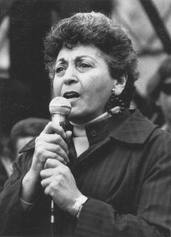
The Fourth International (FI) was a political international established in France in 1938 by Leon Trotsky and his supporters, having been expelled from the Soviet Union and the Communist International.

The Freedom Socialist Party (FSP) is a trotskyist and socialist feminist political party in the United States. FSP formed in 1966, when its members split from the Socialist Workers Party.

Solidarity is a revolutionary multi-tendency socialist organization in the United States, associated with the journal Against the Current. Solidarity is an organizational descendant of the International Socialists, a Third Camp Marxist organization which argued that the Soviet Union was not a "degenerated workers' state" but rather "bureaucratic collectivism," a new and especially repressive class society.
The League for Socialist Action (LSA) was the premier Trotskyist organization in Canada for much of the 20th century. Throughout its history the LSA went through many different names and iterations. In chronological order it was known as: the International Left Opposition (Trotskyist) of Canada, the Workers Party of Canada, the Socialist Policy Group, the Socialist Workers League, the Revolutionary Workers Party, The Club, the Socialist Education League, and the League for Socialist Action.
James Robertson (1928–2019) was the long-time and founding National Chairman of the Spartacist League (US), the original national section of the International Communist League. In his later years, Robertson was consultative member of the ICL's international executive committee.

The Socialist Union of America, also called American Socialist Union, Socialist Union or Cochranites were a Trotskyist group that split from the Socialist Workers Party in 1953 and disbanded in 1959. It included most of the SWPs trade union base, as well as others sympathetic to the "Pabloist" line of the International Secretariat of the Fourth International, though it was never recognized as a section of the ISFI.

Myra Tanner Weiss was an American Communist following Trotskyism, and a three time U.S. vice presidential candidate of the Socialist Workers Party (SWP).

Clara Fraser was a socialist feminist political organizer, who co-founded and led the Freedom Socialist Party and Radical Women.
Richard S. Fraser was an American Trotskyist and the principal theoretician of the doctrine of revolutionary integrationism in the 1950s within the Socialist Workers Party (US), against George Breitman's advocacy of support for black nationalism. He joined the Trotskyist movement in 1934, and was a founding member of the Socialist Workers Party (SWP) in the US. He made a study of the black question in the late 1940s, after the Party began to lose hundreds of black recruits. This was due not only to the rise of McCarthyist repression of the SWP, but also, of the party's burgeoning opportunism on the question of black nationalism. Informally, the leadership had even begun discouraging white and black members from forming interracial couples.
The Trotskyist Organization of the United States was a small Trotskyist group active in the U.S. during the 1970s and 1980s. The group was founded by two dissident factions which had emerged at the Socialist Workers Party's 1971 convention.
Under a variety of names and within a number of organizations over at least 17 years, the group around Harry Turner, or Turnerites was a presence within Trotskyism in the United States.
The Internationalist Workers Party (Fourth International) was a Trotskyist group in the United States. It was the American affiliate of the Morenoist International Workers League (Fourth International). It was unique in that it was the first American Trotskyist organization whose membership came principally from the Hispanic demographic.

The Spark is a Trotskyist group in the United States aligned internationally with the Lutte Ouvrière tendency.

The Spartacist League/U.S. is a Trotskyist political grouping which is the United States section of the International Communist League, formerly the International Spartacist Tendency. This Spartacist League named themselves after the original Spartacus League of Weimar Republic in Germany, but has no formal descent from it. The League self-identifies as a "revolutionary communist" organization.
The Revolutionary Tendency within the American Socialist Workers Party was an internal faction that disagreed with the direction the leadership was taking the party on several important issues. Many groups and movements would have their roots in the RT, both in the United States and internationally, including the Socialist Equality Party and the world Spartacist and LaRouche movements and their various splinters.

The Socialist Equality Party (SEP) is a Trotskyist political party in the United States. SEP first formed in 1964 as the American Committee for the Fourth International, created by expelled members of the Socialist Workers Party. SEP and its previous forms were associated with the International Committee of the Fourth International (ICFI), a Trotskyist political international.

The Fourth International (FI), founded in 1938, is a Trotskyist international.

The International Communist League (Fourth Internationalist) abbreviated as ICL(FI), earlier known as the international Spartacist tendency (iSt) is a Trotskyist international. Its largest constituent party is the Spartacist League (US). There are smaller sections of the ICL (FI) in Mexico, Canada, France, Germany, Ireland, Italy, Japan, South Africa, Australia, Greece and the United Kingdom.

The Workers World Party (WWP) is a Marxist–Leninist communist party in the United States founded in 1959 by a group led by Sam Marcy. WWP members are sometimes called Marcyites. Marcy and his followers split from the Socialist Workers Party (SWP) in 1958 over a series of long-standing differences, among them their support for Henry A. Wallace's Progressive Party in 1948, their view of People's Republic of China as a workers' state, and their defense of the 1956 Soviet intervention in Hungary, some of which the SWP opposed.

The Socialist Workers Party (SWP) is a communist party in the United States. The SWP began as a group which, because it supported Leon Trotsky over Soviet leader Joseph Stalin, was expelled from the Communist Party USA. Since the 1930s, it has published The Militant as a weekly newspaper. It also maintains Pathfinder Press.








